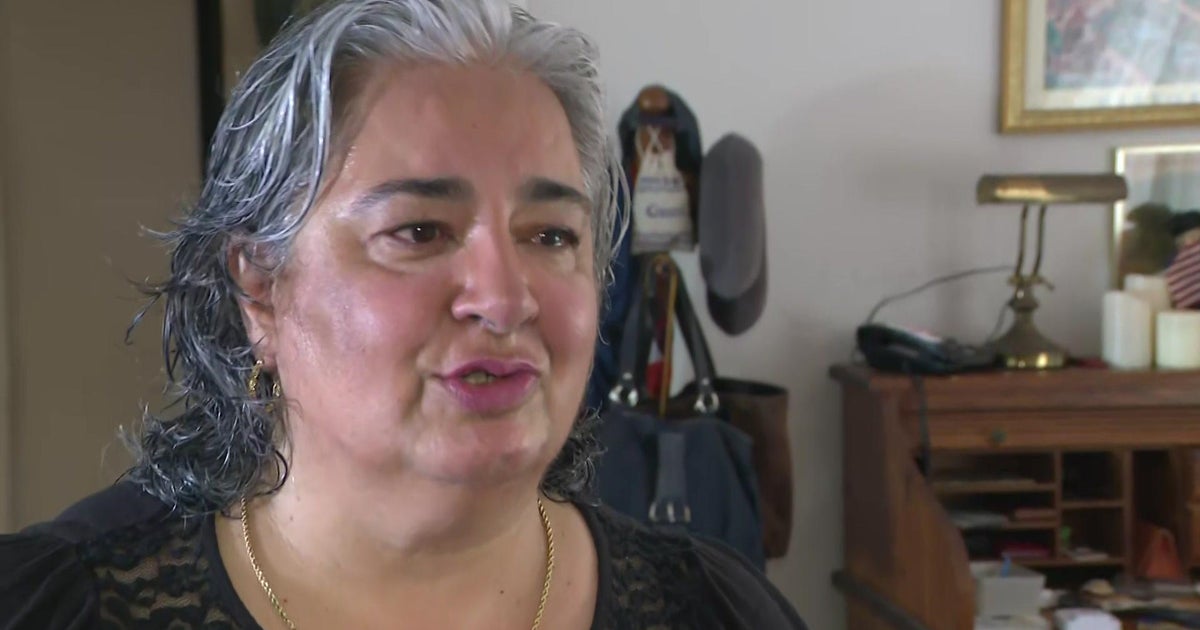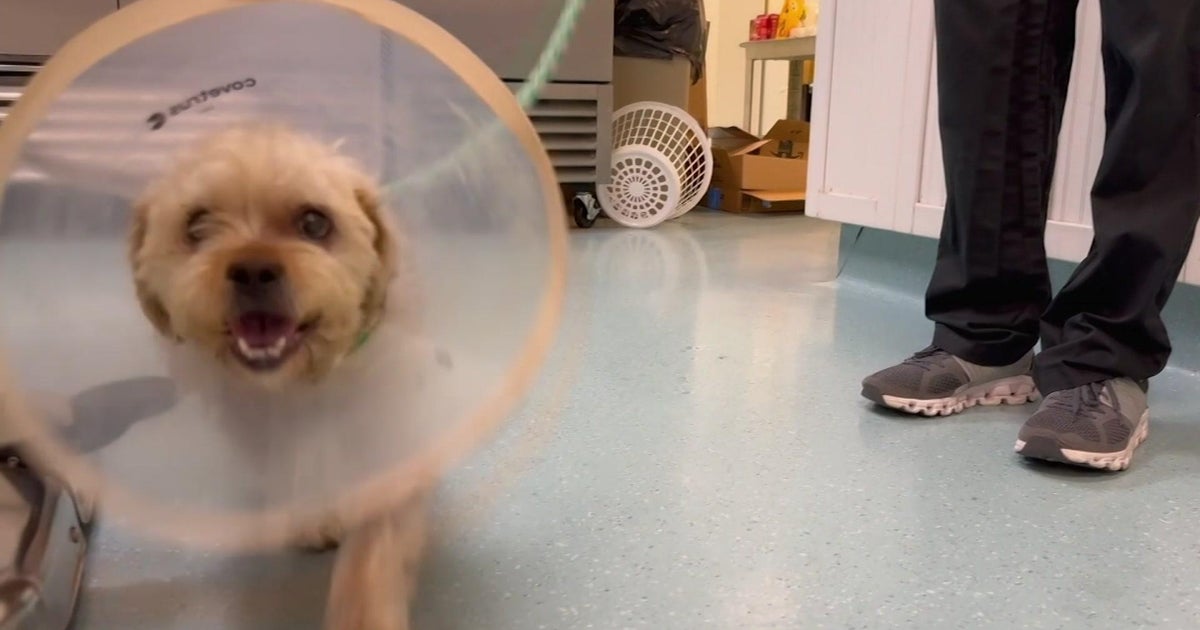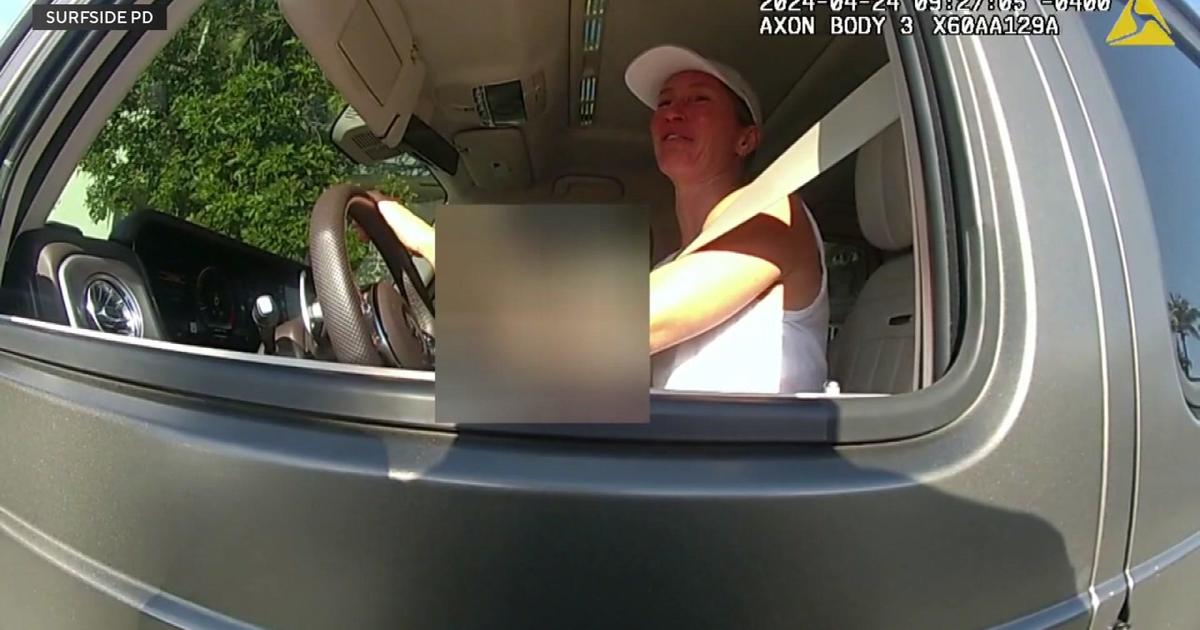Illuminating Alzheimer's: The patients, the memory keepers, and latest research
NOTE: This story was originally published on June 28th, 2023.
MIAMI - In honor of Alzheimer's and Brain Awareness Month, CBS News Miami is "Illuminating Alzheimer's."
Through our reporting, we are shining a light on a disease many consider a long, dark goodbye.
With more than 6 million Americans currently living with Alzheimer's, some local experts have deemed this a public health pandemic.
"They say if nothing's done 130 million people worldwide will have Alzheimer's. It just is astounding. It blows your mind," said Dr. Margaret Pericak-Vance, a world-renowned geneticist at the University of Miami.
Meanwhile, caregivers are shouldering a mounting physical, mental and emotional load, and the cost of caring for patients is skyrocketing.
"It's a public health emergency," said Dr. Tomás R. Guilarte at Florida International University. "Certainly for the healthcare system, billions and billions of dollars, slated to be trillions 25 years from now."
New treatments are on the horizon, but some say action is needed now.
In the battle against Alzheimer's disease, we are all on the front lines.
"I'm not going to stand by and wait 'til it catches me," said patient Sury Veliz. "I'm going to put up a fight."
Alzheimer's disease is characterized by progressive memory loss that gets worse over time.
Sury Veliz has always considered herself the family "memory keeper."
She has hard drives filled with photos and she can rattle off stories from childhood.
But she's also living with the fear those memories may fade faster than anticipated.
At 56 years old, Veliz is living with Alzheimer's disease.
"Forgetting stuff. General stuff. Things you'd think it's no big deal. But it wasn't little things it was a lot of little things. Constantly forgetting something," she said of the months and years before diagnosis. "Constantly repeating myself, same story, over and over again.
Now, the story Veliz is sharing is her own, in hopes of raising awareness for Alzheimer's disease.
"I actually got diagnosed at 52. But I'd already seen the signs since I was 50," she said. "They did a bunch of cognitive tests and I failed them. They did the MRI and the PET scan and the PET scan confirmed I already had the amyloid starting in the front lobe."
When asked how she reacted to the diagnosis, Veliz said, "Oh man, gut-wrenching. I was like s***. I'm going down the same path. My father's path. My grandmother's path. I was going down it."
Alzheimer's runs in Sury's family.
Her father and paternal grandmother both had it.
She did genetic testing that showed she too, would likely develop the disease.
On average, most patients are over 65. Her father was diagnosed at 62 years old.
She says she saw the signs well before that.
"In the beginning, it's the little forgetfulness stuff. He was losing his car in the parking lot. Or driving around and not knowing how to get back home. And one day, he took the boat. He got on the boat and he took off and he calls my mom and says I don't know how to get back. How do we find him?" she said. "It eventually progresses. It gets worse. It gets to literally I saw my dad go back to a child stage. Complete and total child stage. But there were those lucid moments where he would sit there and go 'I don't want to live like this anymore. Kill me.' But what do you do? You can't do anything. And then he would forget that he said that. Those little moments. I don't want to get to that point.
Veliz said she can't dwell on her disease's progression.
"If I start worrying about it I won't stop crying," she told CBS News Miami's Lauren Pastrana. "I have to do it for my girls. I can't leave it so that they have to be caring for me."
Sury has vowed to fight.
In fact, her fight started before she was even officially diagnosed.
Because of her young age, it was difficult to get the testing to confirm Alzheimer's, so she says she found a study through Facebook.
Now, as part of that blind study, she receives weekly injections, but she doesn't know what she's taking. She just hopes it's working.
"The studies are not fun. Sometimes they're painful. That is better than the alternative. If that's what I have to do. If every week I have to show up to the study and get shots or whatever, I will do." she said. "I have seen an improvement. I don't want to get my hopes up very high because I don't want to be disappointed either. But I do see an improvement in what I remember."
A lot of research on the topic is happening right here in South Florida.
Scientists at UM and FIU hope they're on the brink of promising new discoveries.
"We know a lot compared to when I started in Alzheimer's. But it's like exploding now," said Dr. Pericak-Vance, the director of the University of Miami Miller School of Medicine's John P. Hussman Institute for Human Genomics.
She has been studying Alzheimer's for more than four decades and led a team at Duke University in 1993 responsible for the groundbreaking discovery that a common genetic variant known as APO-E4 increases the risk of Alzheimer's disease.
"One of the things we want to do here, because in the past people who are looking at social determinants of health, and the people doing genetics when really the answer is to bring them together," she said.
Statistics show Hispanic and African American populations are at increased risk of developing Alzheimer's, but it's not just about genes.
"It has to be some of these other things, some of these health disparities, access to healthcare, stress, all these other things that become increasingly important and that we have to study and understand," Dr. Pericak-Vance explained.
"The major risk factor is age. Aging. Certainly genetics, we know certain genes are at risk for these neurodegenerative diseases," said Dr. Tomás R. Guilarte, the Dean of Florida International University's Robert Stempel College of Public Health and Social Work. "And then scientists began to realize that you live in an environment and you're exposed to many different things. So now today gene-environment interactions are of interest in the context of neurodegenerative diseases."
Dr. Guilarte's lab is bustling with students studying the brain.
He's done extensive research with the neuroinflammation protein TSPO and what role it plays in the progression of Alzheimer's disease.
SEE ALSO: Alzheimer's researchers: Simple eye exam may bring brain health into focus and emerging technology aims to help Alzheimer's patients
"If we delete this protein, it looks like it may slow down the progression of the disease. Now if that turns out to be the case, it's an important discovery because there are drugs we can use to target this protein that can potentially do the same thing. That's the work that's being done here," he said.
Dr. Jason Richardson works with Dr. Guilarte at FIU's Brain, Behavior and the Environment program.
He describes the current state of Alzheimer's as a "public health pandemic."
"We don't use that word lightly after what we've gone through with Covid, but if you think of the number of individuals we have now and the projections for 2040, we're talking about a tripling of people with Alzheimer's," he said.
Dr. Richardson says new research indicates DDE, which is found in the environment as a result of the now-banned insecticide DDT, can affect the brain, even at very low levels.
"What we found was that if you were above a certain level of a very persistent pesticide metabolite called DDE, you were more than 4 times as likely to be diagnosed with Alzheimer's disease," he said. "They stay in the human body from years to decades. That particular metabolite we found associated with Alzheimer's disease, even currently, 95% of the population of the United States has detectable levels of them in the body.
Back at UM, Dr. Rosie Curiel Cid with the Center for Cognitive Neuroscience and Aging has developed a cognitive stress test to detect mild impairment at the earliest stages of the disease.
"The population is aging and we need to do a good job to take care of ourselves and take care of our loved ones as we age. So I think everyone should be understanding that as a society, we are moving into an era that we've never had to experience before," she cautioned.
She adds there's progress being made on blood tests that would make diagnosis much easier.
"Technological advancements have allowed us to now be able to detect these proteins like amyloid and Tao in the blood of individuals," Dr. Curiel Cid said. "This is transformative for the future because individuals can access, once the science leads us there, the goal would be for people to access faster diagnosis and be able to make decisions about their life well before they're impaired."
According to the Alzheimer's Association, there are an estimated 827,000 unpaid caregivers in Florida.
But as we found out, their "free" care comes at a cost, with more than 66 % of caregivers reporting their own chronic health conditions and nearly 30 % suffering from depression.
Ivette Teyra and Ashely Alvarez have a lot in common.
They're both the youngest of 4 siblings. They're both passionate about animals and their careers. And they're both caregivers for aging parents with Alzheimer's disease.
"I put myself in his place. How would I want to be treated if I had that disease and that is the way I treat him?" Ivette says of caring for her father Aurelio.
"I have a lot of respect toward her, especially as a former caregiver herself," Ashley said when talking about her mother, Mirta.
Mirta Alvarez is a retired school teacher, adored by her students.
She once cared for her own mother with Alzheimer's disease.
Now bedridden, Mirta was diagnosed about 9 years ago. Ashley was in college at the time.
"I actually had to ask for three incompletes my last semester of my Master's program. I was entering Summer A and that's when I started noticing my mom was trying to take the keys to go out and get her cafe con leche from her favorite bakery. And she no longer could remember and she would come back with the car all scratched up. And I went, 'oh no.' This is a danger to everybody and it's a danger to her. First, I have to think of other people because we don't want anybody else to get hurt. So I had to take away her keys and from that point on I was seen as the bad person."
Ashley recalls recording her mother the first time she said "you are not my daughter". She said she needed proof to show the rest of the family just how advanced her mother's disease had become.
"She did everything for me, and now I want to do everything for her. Everything that I possibly can," Ashley said. "She always said she wanted to give us everything that she never had and more, and now I want to be able to do that for her.
Ivette Teyra describes a similar sense of duty.
Her father Aurelio was diagnosed 11 years ago.
"My dad is a character. He is funny. He's very strong-willed. He's stubborn," she said. "He has an amazing ability to love but he can be stubborn and a handful, with or without Alzheimer's."
Ivette handles her father's care along with her older sister.
"I was 7 years old when my parents divorced and all of my siblings and I stayed with my dad. They were grown up, in their teens, and pushing 20, so I was always with my dad. So I just think, you're supposed to honor your father and your mother and that's just what we're doing, is giving back to him because he gave so much... I think not only returning the favor, but I'm a person of big faith, so I believe it's what God wants me to do."
According to the Alzheimer's Association, in 2022, caregivers nationwide provided an estimated 18 billion hours of unpaid care.
Approximately two-thirds of caregivers are women and one-third of dementia caregivers are daughters.
And like so many others, both Ivette and Ashley had their own health issues to deal with.
"I went into a depression. I had to go on anti-depressants," Ashley recalled. "Having to go through that was probably the worst time of my life. But going to the Alzheimer's Association and seeing other people in my situation, I was able to lift myself up and say, no I'm not going to fail right now."
For Ivette, her own brain health took a drastic turn.
"Five years ago, I suffered a brain hemorrhage. Surprisingly, who was at my bedside every day was my dad. He was there every day and I was in a coma the whole thing. Even in the midst of that, we had a plan," she said, a testament to the fact that caregivers never really have "time off".
Licet Valois is a social worker with the Institute for Neurodegenerative Diseases of Florida.
She helps patients and caregivers navigate what life will look like with Alzheimer's disease.
"It is difficult. And sometimes we forget who we are as caregivers and we give all our efforts to the other individual and we forget about who we are," she said.
She speaks from experience, having cared for a loved one with a serious illness and memory loss.
She says help is out there, in the form of support groups, counseling, and respite care.
"We are here to support people emotionally and psychologically only if you are willing to be supported," Valois added.
"It's so important if your viewers have someone in their life or come across somebody in their life, to educate themselves about Alzheimer's. Before you can help, you have to understand the disease, have to understand what that person is going through," Ivette said.
When asked what advice she had for new caregivers, Ashley added, "Be patient. Be kind to yourself. Be kind to them. And seek help."
There is no cure for Alzheimer's disease.
But there are treatments that have shown promise in slowing symptoms and improving the quality of life for patients and one medication is on the verge of full FDA approval next month.
Remember Sury Veliz?
She's part of a clinical trial for an Alzheimer's drug, but she doesn't know what she's taking because it's a "blind study".
It's possible she's taking one of the drugs the FDA is considering, but she couldn't confirm it with absolute certainty.
"I have the hopes that I'm on the medication because I do see improvement," she said. "So long as it saves my life and my memory and my brain. I will take whatever you give."
Dr. Raphi Wald with the Marcus Neuroscience Institute at Baptist Health's Boca Regional campus believes we are close to breakthroughs.
"A lot of the research we are focusing on, a lot of it is in the same area, which is in monoclonal antibody therapy," he said.
Earlier this year, the FDA granted accelerated approval for Lecanemab (brand name Leqembi) for patients with mild cognitive impairment.
Last month, drugmaker Eli Lilly released findings that showed its monoclonal antibody therapy Donanemab "significantly slowed cognitive and functional decline in phase 3 study."
Dr. Wald says these types of treatments target "abnormal bodies in the brain", such as beta-amyloid protein.
But there are some pretty serious side effects.
"When you introduce these medications into a person's brain, what happens is they attack all of those bodies, including the ones that are attached to a blood vessel," he said. "When you attack those bodies and you destroy them, it can leave a hole in those blood vessels which causes them to bleed into the brain. Which is also very damaging."
The Centers of Medicare and Medicaid Services (CMS) does not currently cover these drugs, which can cost more than $26,000 a year.
Last week, CMS released guidance that said "If the Food and Drug Administration (FDA) grants traditional approval, then Medicare will cover the drug in appropriate settings that also support the collection of real-world information to study the usefulness of these drugs for people with Medicare."
Dr. Curiel Cid at UM said patients and their loved ones should proceed with caution.
"While it might be working on that beta-amyloid that's accumulating in the brain, and again that's an advancement, it may not necessarily change the way that they're functioning in their day to day life," she said. "I think that one of the things we need to consider before payer sources move forward with making this very widespread is the level of risk it may have in the general population. I think that's something that needs to be carefully thought through before it's made widely available."
Other medications on the market for years have been found to give patients some extra time of improved functioning.
But as far as a long-term solution, you have to start years before you even suspect any symptoms.
"Exercise with the approval of your doctor. Walk. Walking is so important. It keeps your blood vessels healthy. It keeps your heart healthy. I strongly encourage everyone to walk. Yes, doing puzzles and playing games on your phone are great. But much more important than that is managing your vascular health," Dr. Wald said.
He also stresses the importance of a healthy diet and getting good sleep.
"About 30% of the variants of dementia is in our hands," Dr. Curiel Cid said. "So there's a lot that we can do and we should be doing to raise awareness of how we can improve our resilience to the risk of Alzheimer's disease."
Organizations like the Alzheimer's Association are here to raise awareness, funds and the red flag, to let lawmakers know change is needed.
"We have finally started what we would call the era of treatment, but CMS have denied of some of the latest treatments and blocked coverage," said Alexander Lewy, the director of the Walk to End Alzheimer's Miami.
"We are fighting to make sure that every family has access. It's important because there are 2000 people every day crossing that threshold that are no longer eligible for this type of treatment because Medicare is blocking it right now. So stepping up and lending your voice and being part of the solution means really being able to ensure that families get access to care and that more research is happening in the field," Lewy said.
The FDA will consider full approval of Lecanemab in early July. Approval would, in theory, make the drug available to more than a million patients in the early stages of Alzheimer's.
Lewy said this is a topic everyone in the community should be monitoring closely.
"It's a huge impact. Not only is it that 62,000 folks in Miami-Dade County have Alzheimer's, but two-thirds of those individuals are also women. The Black community is twice as likely. Hispanics are 1.5 times as likely as their white counterparts, so this is a disease that affects the entirety of our community," he said.
Last year, Florida Gov. Ron DeSantis visited Broward Health to sign the READY Act-- Ramping Up Education of Alzheimer's Disease and Dementia for You. This year's state budget included additional funds for awareness and research, as well as $1 million in funding for the Florida Alzheimer's Center of Excellence.
"The real goal for this is that we want to make sure families can spend more time with their loved ones," Lewy said. "They need to know the treatment is available to families so they can have those extra years of life."
For more information, visit the Alzheimer's Association at ALZ.org.
You can also call the 24/7 helpline at 800-272-3900.




